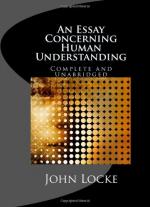
|
| Name: _________________________ | Period: ___________________ |
This test consists of 15 multiple choice questions and 5 short answer questions.
Multiple Choice Questions
1. What does Locke say must be learned along with ideas?
(a) The uses they can be put to.
(b) The words that refer to them.
(c) The morality of them.
(d) The consequences of them.
2. What does Locke say about the knowledge of how property rules should be established?
(a) It must be doubted.
(b) It must be learned.
(c) It must be established anew each generation.
(d) It should be scientifically evaluated.
3. What does Locke say retention allows us to do?
(a) Evaluate ideas.
(b) Forget ideas.
(c) Store ideas.
(d) Organize ideas.
4. What is the contemporary name for Locke's field of inquiry?
(a) Epistemology.
(b) Existentialism.
(c) Comparative religion.
(d) Ontology.
5. What does Locke use as an example of abstraction?
(a) Nature.
(b) People.
(c) History.
(d) Chairs.
6. How does Locke try to look at understanding?
(a) In a vacuum.
(b) Biologically.
(c) As the result of evolution.
(d) Relative to the passions.
7. What does Locke say about sensations that an infant feels in utero?
(a) They are the basis of innate knowledge.
(b) They form the instincts.
(c) They do not constitute innate knowledge.
(d) They must be un-learned.
8. What standard would an idea have to meet to be considered innate?
(a) Everyone would have to believe it.
(b) No one would be able to capture or limit it.
(c) It would be secret and unspoken.
(d) It would have to be approved by a majority.
9. How does Locke say ideas change over time?
(a) They solidify.
(b) They ossify.
(c) They degrade.
(d) They loosen up.
10. Composition is the ability to do what, according to Locke?
(a) Invent new ideas.
(b) Combine ideas.
(c) Use ideas for practical purposes.
(d) Replace ideas with other ideas.
11. What happens to a particular idea when you practice abstraction?
(a) You see it in context.
(b) You subtract particulars.
(c) You use it for religious purposes.
(d) You see the opposite of the idea.
12. What does Locke show about the ideas people claim are innate?
(a) That they are questionable.
(b) That not everyone believes them.
(c) That they are culturally relative.
(d) That they are determined by cultural forces.
13. Where do secondary qualities originate, according to Locke?
(a) Interactions.
(b) Things themselves.
(c) In the universe.
(d) Historical narratives.
14. What quality does Locke say innate principles lack?
(a) Universal consent.
(b) Translatability.
(c) Presentability.
(d) Variability.
15. Where do primary qualities originate, according to Locke?
(a) Experiences.
(b) They do not originate.
(c) Interactions.
(d) Things themselves.
Short Answer Questions
1. What does Locke say number indicate about a thing?
2. Who proposed the notion that knowledge begins in doubt?
3. What claim is Locke attacking in "Essay Concerning Human Understanding"?
4. What does Locke argue against in Chapter 2 of Book I?
5. What does reflection create ideas out of?
|
This section contains 501 words (approx. 2 pages at 300 words per page) |

|




